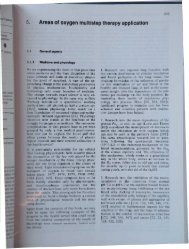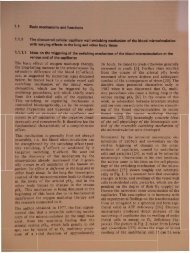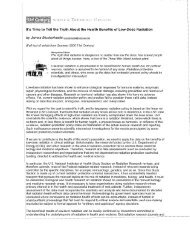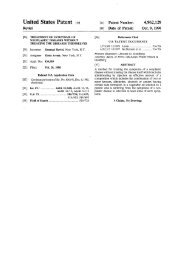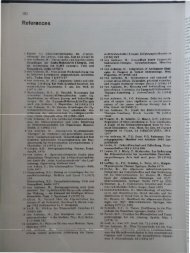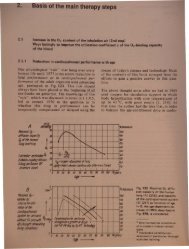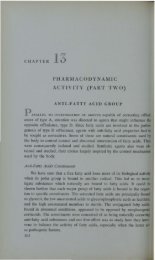- Page 5:
NARCOTICS RESEARCH, REHABILITATION,
- Page 9 and 10:
::VEXHIBIT NO. 4 (a) AND (b)Eddy, D
- Page 13:
NARCOTICS RESEARCH, REHABILITATION,
- Page 17 and 18:
urden that such addiction imposes u
- Page 19 and 20:
1 (lata; (->) the sliariiis" oF iii
- Page 21 and 22:
9Chairman Pepper. The committee is
- Page 23 and 24:
::11quota production from unrecogni
- Page 25 and 26:
13in this country. This raises the
- Page 27 and 28:
15from other clinical projects of w
- Page 29 and 30:
:17practice, experience has indicat
- Page 31 and 32:
;19.I think a quota would be better
- Page 33 and 34:
21When methadone was first introduc
- Page 35 and 36:
:::::.—23American Society of Phar
- Page 37:
_'—25.I'BOCUREMENT AND ISSUE DATA
- Page 40 and 41:
'.28Fiscal years-1967 1968 1969 197
- Page 42 and 43:
30rally in opium. By indirect, the
- Page 44 and 45:
32We can, I think, most helpfully g
- Page 46 and 47:
34so intense that we haven't done v
- Page 48 and 49:
Dr. Eddy. Well, physicians, usually
- Page 50 and 51:
38Dr. Eddy. No.Chairman Pepper. Now
- Page 52 and 53:
:40get away with it as Dr. Keats su
- Page 54 and 55:
:—:42public health hazard was jud
- Page 56 and 57:
:44Bibliography(1 Nathan B. Eddy. "
- Page 58 and 59:
46(52) Nathan B. Eddy. "Dilaudid."
- Page 60 and 61:
48(98) "The New Narcotics, Post-gra
- Page 62 and 63:
^.50
- Page 64 and 65:
52entails the consideration of addi
- Page 66 and 67:
54Chairman Pepper. Have you found t
- Page 68 and 69:
56^.I wonder would you care to comm
- Page 70 and 71:
58Chairman Pepper. Without objectio
- Page 72 and 73:
—1958-681959-«419691962-64196219
- Page 74 and 75:
—62abuse and has brought about th
- Page 76 and 77:
64bank robbery or an assault. You d
- Page 78 and 79:
66Mr. Wiggins. Would the stopping o
- Page 80 and 81:
68—Chairman Pepper. Can you give
- Page 82 and 83:
:70The problem then would be the wi
- Page 84 and 85:
;72taking exceptional measures in t
- Page 86 and 87:
)—74pay serious attention to this
- Page 88 and 89:
;76From 1958 to 1961, he served as
- Page 90 and 91:
78deine in painkilling drugs. So if
- Page 92 and 93:
;80ning capabilities, responsibilit
- Page 94 and 95:
;:;82terials. If they could introdu
- Page 96 and 97:
84Figure 1infrared Ektachrome film
- Page 98 and 99:
;86Figure 3.—Tones of wheat (W) a
- Page 100 and 101:
88ers at the poppyfields or at any
- Page 102 and 103:
:90;:tional situations has handicap
- Page 104 and 105:
;;92Locating illicit opium cropsDet
- Page 106 and 107:
94Jaffe. Well, there would be some
- Page 108 and 109:
96Mr. Jaffe. Primarily on the fact
- Page 110 and 111:
98in the same ball park about what
- Page 112 and 113:
100Chairman Pepper. Mr, Waldie, do
- Page 114 and 115:
::102agencies and input data would
- Page 116 and 117:
104most facilities are barely able
- Page 118 and 119:
;106We have also studied a ^roup of
- Page 120 and 121:
108Dr. Gearing. Yes, sir; I would n
- Page 122 and 123:
110somethino: in the nei
- Page 124 and 125:
112program is put into the machiner
- Page 126 and 127:
I114you have some data there that s
- Page 128 and 129:
116Dr. Gearing. It depends on what
- Page 130 and 131:
118Chairman Pepper. Would you have
- Page 132 and 133:
120it not be so that we could proje
- Page 134 and 135:
.122admission rate was approximatel
- Page 136 and 137:
124BESULTS(1) Although many of the
- Page 138 and 139:
1262. All the members of the methad
- Page 140 and 141:
128HETHADOHE MAINTENANCE TREATMENT
- Page 142 and 143:
11 1 1 1 1 11130Methadone Halnten?n
- Page 144 and 145:
132TABLE 2.-METHAD0NE MAINTENANCE T
- Page 146 and 147:
134Figure 9 Methadone tlaintenance
- Page 148 and 149:
136Methadone Ka'ntanance Treatmf:nt
- Page 150 and 151:
:::.::.138Appendix A^—Methadone M
- Page 152 and 153:
140nance treatment patients showing
- Page 154 and 155:
142Figure 3 •lethadone Kaintenanc
- Page 156 and 157:
144Dr. DuPoNT. 1,760 on methadone m
- Page 158 and 159:
:146there are dramatic reductions i
- Page 160 and 161:
148Health insurance coverage for me
- Page 162 and 163:
150Dr. DtjPont. Well, there are no
- Page 164 and 165:
152Mr. Blommer. You would agree the
- Page 166 and 167:
154done. Where is the evidence ? No
- Page 168 and 169:
156There are several reasons a pers
- Page 170 and 171:
158It would seem to me a very busy
- Page 172 and 173:
160we had before. I don't think it
- Page 174 and 175:
162heroin addiction and support all
- Page 176 and 177:
164Dr. DuPoNT. I am reluctant to ge
- Page 178 and 179:
166Using this figure as rule of thu
- Page 180 and 181:
)168ment facilities for heroin addi
- Page 182 and 183:
.170parole departments. None were c
- Page 184 and 185:
::172Table 2.— Selected character
- Page 186 and 187:
174TABLE 3.—HEROIN ADDICTION RATE
- Page 188 and 189:
176W.a^^cc-V.c Cffv..AdF-ro ftcoKjL
- Page 190 and 191:
178.^06V f\QrK-'SEt G^ouP/AJ6SIS're
- Page 192 and 193:
I180*i coo)u->CM>—'CMUJCOO O COa>
- Page 194 and 195:
I(/I182esiMmin0)^> oo.00 =E|c O.2 o
- Page 196 and 197:
184encouraged to return to methadon
- Page 198 and 199:
186or other side effects. This incr
- Page 200 and 201:
:188number as that on the bottle. W
- Page 202 and 203:
190Attachment ThreeTo all medical s
- Page 204 and 205:
-jI IALLI192ATTACHMENT- FIVE,J: IPA
- Page 206 and 207:
194ATTACHMENT NINEGOVERNMENT OF THE
- Page 208 and 209:
......—196half of the addicts sta
- Page 210 and 211:
198CONCLUSIONSCertain patterns emer
- Page 212 and 213:
200TABLE 5.— PROFILE OF BARBITUAR
- Page 214 and 215:
202TABLE ll.-SUPPORT OF HEROIN HABI
- Page 216 and 217:
204TABLE 17.-AGE OF ADDICTS AND NON
- Page 218 and 219:
206TABLE 23.—PRESENT MARITAL STAT
- Page 220 and 221:
208TABLE 28.-MILITARY SERVICEAddict
- Page 222 and 223:
:210The committee is pleased to cal
- Page 224 and 225:
212sists of a network of 21 geograp
- Page 226 and 227:
214(6) Basic studies on the nature
- Page 228 and 229:
216in fact, constitute autonomous o
- Page 230 and 231:
Chairman Pepper. Mr. Perito?218;; M
- Page 232 and 233:
^'220is not a very forgiving drug.
- Page 234 and 235:
'222Furthermore, in our present con
- Page 236 and 237:
—224the Federal Government decide
- Page 238 and 239:
-—I have presented one generic ki
- Page 240 and 241:
,clinic;?,>•
- Page 242 and 243:
230I realize we are running late.Do
- Page 244 and 245:
''232'']Vir. Winn. Tiien you mentio
- Page 246 and 247:
234So having put it in the area, ha
- Page 248 and 249:
,Memberships'—i236privilege of co
- Page 250 and 251:
;238A central hypothermic response
- Page 252 and 253:
;240South Bronx, Bedford-Stuyvesant
- Page 254 and 255:
242€are of patient addicts. We ha
- Page 256 and 257:
244hospitals in the city, came into
- Page 258 and 259:
246that came into my office, and I
- Page 260 and 261:
'Mr.;>•/nmo'.i,,;248deputy commis
- Page 262 and 263:
:250two Rockefeller Institute physi
- Page 264 and 265:
:252during pliase II that serious e
- Page 266 and 267:
254well-structured methadone mainte
- Page 268 and 269:
;:256nonsense and serves only to ad
- Page 270 and 271:
:258you best complete your statemen
- Page 272 and 273:
260Mr. Pertto. Based upon your expe
- Page 274 and 275:
262A a'reat case in point was a con
- Page 276 and 277:
«264Mr. Steiger. Did you discuss w
- Page 278 and 279:
—:266Mr. HoRAN. We don't support
- Page 280 and 281:
268Mr. Horan, let's back up a littl
- Page 282 and 283:
270It is not up to heroin or morphi
- Page 284 and 285:
272nesses yesterday who brought out
- Page 286 and 287:
274;Mr. Perito. It is my understand
- Page 288 and 289:
276So that at the end of the week t
- Page 290 and 291:
278steroid he lias in him we might
- Page 292 and 293:
280Mr. Perito. You are referriii"'
- Page 294 and 295:
282not drug free. I can say approxi
- Page 296 and 297:
28 A$2-a-day habit these individual
- Page 298 and 299:
•As286I got to the point once in
- Page 300 and 301:
288Mr. Steiger. You mentioned anoxi
- Page 302 and 303:
290Mr. Eangel. I could see then tha
- Page 304 and 305:
292Dr. Casriel. Mr. Keating, I have
- Page 306 and 307:
j294What period of time are ^ve tal
- Page 308 and 309:
296was March of 1970—he was admit
- Page 310 and 311:
298"The paper by Dole and Nyswander
- Page 312 and 313:
:300vent them from coming to New Yo
- Page 314 and 315:
302[Exhibit No.14(b)]Casriel Instit
- Page 316 and 317:
304to result from the insuflScient
- Page 318 and 319:
306It is this role of the intervent
- Page 320 and 321:
308EESULTSStudies concerning tlie p
- Page 322 and 323:
310The method derives from a specia
- Page 324 and 325:
312Why is this happening? What need
- Page 326 and 327:
m)effective with uncured alcoholics
- Page 328 and 329:
I316Casriel, who is medical-psychia
- Page 330 and 331:
318resort to heroin. One must not f
- Page 332 and 333:
.320in Permanent Cure of Narcotic A
- Page 334 and 335:
322!(4) '-Modification of Adaptatio
- Page 336 and 337:
324sections of the country, all sor
- Page 338 and 339:
;Mr.Pertto.niuch,I?,Mr. Peritq. Tha
- Page 340 and 341:
328Chairman Pepper. Mr. Steiger.Mr.
- Page 342 and 343:
, Mr., In''wMr, WiNx.nltiiink tlie
- Page 344 and 345:
:332"Stomach cramps" were found to
- Page 346 and 347:
'i.We334'""^li'anTOanl^ETPPEiL That
- Page 348 and 349:
:))))336would be deprived of any cl
- Page 350 and 351:
338less abuse liability than agents
- Page 353 and 354:
NARCOTICS RESEARCH, REHABILITATION,
- Page 355 and 356:
CONTENTSApril 26 1April 27 77April
- Page 357 and 358:
:•vEXHIBIT NO. 4 (a) AND (b)Eddy,
- Page 359:
:lovernor,vnEXHIBIT NO. 21 (a) and
- Page 362 and 363:
342have no desire to preempt the au
- Page 364 and 365:
344We hope these hearings will prov
- Page 366 and 367:
346tons in 1962 and to 155 tons in
- Page 368 and 369:
348SOUTHEAST ASIAAs you know also,
- Page 370 and 371:
350I would also point out as I did
- Page 372 and 373:
352their farmers who have been grow
- Page 374 and 375:
354told that much of the insurgency
- Page 376 and 377:
356Mr. IxGERSOLL. Well, again, Mr.
- Page 378 and 379:
358jority of the heroin problem in
- Page 380 and 381:
360years, but I have been frustrate
- Page 382 and 383:
362Mr, Steiger. If you were goin^ t
- Page 384 and 385:
364report marihuana among junior gr
- Page 386 and 387:
366And it seems to me tliat we Avou
- Page 388 and 389:
?368effectively, then maybe we will
- Page 390 and 391:
370improvement as far as the abilit
- Page 392 and 393:
372was there. Your visits probably
- Page 394 and 395:
374the purchase of Avitnesses—I s
- Page 396 and 397:
:376administrations to publicly say
- Page 398 and 399:
378Chairman Pepper. We will take a
- Page 400 and 401:
380Mr. Ingersoll. No. I don't recal
- Page 402 and 403:
:382can fulfill the vow made by the
- Page 404 and 405:
384have to give you the same answer
- Page 406 and 407:
386Mr. Brasco. But that is another
- Page 408 and 409:
388Mr. Ingeksoll. Well, that is the
- Page 411 and 412:
NARCOTICS RESEARCH, REHABILITATION,
- Page 413 and 414:
-39,3,Dr. Edwards held a surgical f
- Page 415 and 416:
395of Narcotics and Dangerous Drugs
- Page 417 and 418:
397Naloxone, recently approved for
- Page 419 and 420:
399for example, who might be abusin
- Page 421 and 422:
401Now, because of our attention ha
- Page 423 and 424:
403and this is only for the investi
- Page 425 and 426:
405effects this drug will produce i
- Page 427 and 428:
407Now, if it is not used intravene
- Page 429 and 430:
409Mr. Wiggins. Dr. Jennings, does
- Page 431 and 432:
411Penicillin is good for pneumonia
- Page 433 and 434:
413Mr. R ANGEL. But from the studie
- Page 435 and 436:
415Dr. Gardner. Again, we don't hav
- Page 437 and 438:
417Dr. Edwards. I suspect it at lea
- Page 439 and 440:
419On the other hand, if serious si
- Page 441 and 442:
421of the best known programs. Alth
- Page 443 and 444:
423Medical Association, American Ps
- Page 445 and 446:
425of the United States Pharmacopei
- Page 447 and 448:
4275. Repeated examinations. Physic
- Page 449 and 450:
429agement and rehabilitation of se
- Page 451 and 452:
—431As the agenc.v within HEW whi
- Page 453 and 454:
433and complex acts such as driving
- Page 455 and 456:
435(Inig induces physical and psych
- Page 457 and 458:
437Chiiirmtin Pepper. Doctor, I thi
- Page 459 and 460:
439A large proportion of youngsters
- Page 461 and 462:
441Dr. Brown, what would you say is
- Page 463 and 464:
443Chairmiui Pepper. Wliat is tlie
- Page 465 and 466: 446The state of the art is promisin
- Page 467 and 468: 447Lot nie ask you first, is tlic d
- Page 469 and 470: 449Chairman Pepper. Do you happen t
- Page 471 and 472: 451want you to take a look at. We w
- Page 473 and 474: 453In addition to that, there seems
- Page 475 and 476: 455the Mfldict is having a program
- Page 477 and 478: 457—on drugs? By that I mean, vei
- Page 479 and 480: 459\\ e are basically saying, in or
- Page 481 and 482: —;461that this is the extent to w
- Page 483 and 484: 463We could go into the drug area a
- Page 485 and 486: .465program that was i)ut into Jack
- Page 487 and 488: 467Mr. Brasco. Possibly. However, w
- Page 489 and 490: 469him, arrange to get somebody els
- Page 491 and 492: 471ainpheta.mines, or barbiturates.
- Page 493 and 494: 473In the meantime, the Institute d
- Page 495 and 496: 475treated in the community centers
- Page 497 and 498: 477research on narcotics in the sam
- Page 499 and 500: 479c 53 03E
- Page 501 and 502: NARCOTICS RESEARCH, REHABILITATION,
- Page 503 and 504: 483spending for research through NI
- Page 505 and 506: 485There has been no concerted seri
- Page 507 and 508: 487it is left in one of their veins
- Page 509 and 510: 489I do not think I should explain
- Page 511 and 512: 491Dr. ViLLARREAL. Until the reflex
- Page 513 and 514: 493evidence strongly shows is that
- Page 515: 495Chairman Pepper. One other quest
- Page 519 and 520: '.499could result in a laboratory s
- Page 521 and 522: 5qifinds it in normal exploration.
- Page 523 and 524: 503synthesized a large number of na
- Page 525 and 526: 505STATEMENT OE DR. ALBERT KURLAND,
- Page 527 and 528: 507discovered if we iiad taken the
- Page 529 and 530: 509Mr. Perito. Dr. Kurland, do you
- Page 531 and 532: 511Chairman Pepper. Has the Food an
- Page 533 and 534: 513]Mr. Steiger. Do you feel from y
- Page 535 and 536: 515In this second study there was a
- Page 537 and 538: 517were any significant differences
- Page 539: 519The Deceptive Communication and
- Page 542 and 543: .522than a State psychiatric hospit
- Page 544 and 545: 524Department of Mental Hygiene), R
- Page 546 and 547: TABLE 3—COMPARISON OF THE 1ST POS
- Page 548 and 549: 528TABLE 10—RELATIONSHIP OF AGE T
- Page 550 and 551: 530tution and his involvement in th
- Page 552 and 553: Attachment No. 5;r\ N-CH,-CH=CHo ,
- Page 554 and 555: '-534Chart No. U (case No. 672)Disp
- Page 556 and 557: 536Chart No. 4 (case No. 694)Illust
- Page 558 and 559: 538Chart No. 35 {case No. 697)Excep
- Page 560 and 561: 540This amount of heroin is roughly
- Page 562 and 563: 5msuccessful or not in that short a
- Page 564 and 565: 544Chairman Pepper. Would you repea
- Page 566 and 567:
54^creased amount of licit as well
- Page 568 and 569:
—54Sand the bureaucracy and the a
- Page 570 and 571:
,,Mr.550you have used some of the s
- Page 572 and 573:
552so many areas is also a pitiful
- Page 574 and 575:
55,4nitiide of heroin addiction in
- Page 576 and 577:
556reached $976.5 billion, we can w
- Page 578 and 579:
558Mr. Jones was appointed to the c
- Page 580 and 581:
560cant when you consider that Out
- Page 582 and 583:
562criminal act in his lifetime. Ye
- Page 584 and 585:
—564Mr. Perito. Would it be fair
- Page 586 and 587:
566Now, Dr. Cliambers, can yon resp
- Page 588 and 589:
—568Mr. Raxgel. Our distinguished
- Page 590 and 591:
;-570Mr. Jones. That is correct. Ou
- Page 592 and 593:
572the commissioner, $186 million i
- Page 594 and 595:
574there should be something in the
- Page 596 and 597:
576and the way in which the funds a
- Page 598 and 599:
57SDr. Chambers. I think wliat you
- Page 600 and 601:
580Education is the best way of pre
- Page 602 and 603:
58-2Certain essential facts must re
- Page 604 and 605:
584done through determined action,
- Page 606 and 607:
586druffs, has the Nation's largest
- Page 608 and 609:
:588To repeat, methadone maintenanc
- Page 610 and 611:
:590I believe the Federal Governmen
- Page 612 and 613:
:take no such satisfaction. We have
- Page 614 and 615:
594of value in the testimony you ha
- Page 616 and 617:
596gone ahead with several. We have
- Page 618 and 619:
598force within our State Police De
- Page 620 and 621:
60PRased on the proposed goal of 2.
- Page 622 and 623:
602STATEMENT OF HON. MILTON SIIAPP,
- Page 624 and 625:
(51)4and apprehend the wholesalers
- Page 626 and 627:
J'606[Exhibit No. 23Prepared Statem
- Page 628 and 629:
608Under our 1071-72 budget proposa
- Page 630 and 631:
GIOcenters for the treatment of her
- Page 632 and 633:
. Dr.612Bourne informs me that we h
- Page 634 and 635:
614Governors in Atlanta to which re
- Page 636 and 637:
616pretty bad news, because it indi
- Page 638 and 639:
618Scientific statistical ioformati
- Page 640 and 641:
620((')) Finally, I believe that al
- Page 642 and 643:
622Governor Carter. I certainly rec
- Page 644 and 645:
624programs that are now available,
- Page 646 and 647:
626all of the top officials in the
- Page 648 and 649:
628perhaps greater than some of the
- Page 650 and 651:
)630tion and many others attempting
- Page 652 and 653:
632(3) Long term residential self-h
- Page 654 and 655:
634for the support of drug service
- Page 656 and 657:
:636D. NARCO, Inc.Narcotics Addicti
- Page 658 and 659:
638crimes to obtain the necessary m
- Page 660 and 661:
640million to $25 milliou per year.
- Page 662 and 663:
642Mr. Perito. Thank yoii. Mr. Chai
- Page 664 and 665:
644narcotic antagonist, and the oth
- Page 666 and 667:
646. Dr. Kramer. From what I have s
- Page 668 and 669:
—(348your money on, but methadone
- Page 670 and 671:
—650I know of no techinque in pri
- Page 672 and 673:
652Dr. Kramer. Yes, sir. As a matte
- Page 674 and 675:
:'654prison and who liave no—wlio
- Page 676 and 677:
65GDr. KT?A:\rEij. 1 suspect tliat
- Page 678 and 679:
658support some of the inethadone p
- Page 680 and 681:
'6660Dr. IvKAisrKK. 1 believe that
- Page 682 and 683:
662jrest that the Veterans' Adminis
- Page 684 and 685:
664opiates may be ingested in sever
- Page 686 and 687:
666(5) It suppresses the desire for
- Page 688 and 689:
668Many people have benefited from
- Page 690 and 691:
—G70Other researches which may di
- Page 692 and 693:
672synthetic painkillers, our commi
- Page 694 and 695:
074IV. A universal ban on legitimat
- Page 696 and 697:
..676iTlius we must look to educati
- Page 698 and 699:
678states, from Arnold Becker, publ
- Page 700 and 701:
680However, we must look at rehabil
- Page 702 and 703:
:682(a) The natural history of narc
- Page 704 and 705:
684was a heavy user. The decrease i
- Page 706 and 707:
686(13) Wallace. R. K. : Physiologi
- Page 708 and 709:
688TABLE 9.-USE OF "HARD LIQUOR" BE
- Page 710:
UFRAL BOOKBINDING CO. Q /-^ /-» .1



